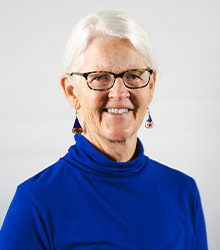
Juliet Baxter
Biography
Jill Baxter’s teaching and research focus on teacher education in STEM fields with the goal of increasing access for all students. As Co-Director of STEM CORE, she works to build strong collaborations between university faculty and K-12 educators. Her recent research examines online professional development that supports K-5 teachers in science and mathematics. Dr. Baxter’s research focuses on the teaching and learning of mathematics and the sciences for underrepresented students. She studies ways to increase the support and materials for teachers and students in under-resourced schools. With the support of two NSF-funded grants, she developed and studied professional development for K-8 teachers of mathematics and science. Earlier as a classroom teacher, she worked to develop curricula and learning opportunities that supported the learning of students in special education and gifted and talented programs. Currently, she is Principal Investigator on a Noyce grant from the National Science Foundation that studies the impact of research internships and equity course work on secondary science teacher candidates. As Co-Director for STEM CORE, she has facilitated a consortium of CAS and COE faculty, K-12 educators, and informal STEM educators that has received state-level grants to promote STEM education throughout Lane County.
Education
Ph. D., 1987, Stanford University
Major: Educational Psychology
Major Advisor: Lee S. Shulman
M.A., 1986, Stanford University
Major: Interactive Educational Technology,
Elementary Teaching Credential, 1979, Gonzaga University
M.A., 1977, University of Minnesota
Educational Psychology
A.B., 1975, Stanford University
Anthropology
Honors and Awards
Fund for Faculty Excellence Award, 2013
